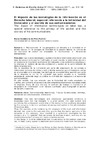Please use this identifier to cite or link to this item:
http://hdl.handle.net/10553/72043
| Title: | The impact of information technologies on labor law, a special reference to the privacy of the worker and the secrecy of his communications | Other Titles: | El impacto de las tecnologías de la información en el Derecho laboral, especial referencia a la intimidad del trabajador y el secreto de sus comunicaciones | Authors: | Pino Padron, Maria Candelaria del | UNESCO Clasification: | 3325 Tecnología de las telecomunicaciones 560403 Tribunales 560502 Derecho civil |
Keywords: | Electronic Communications Constitutional Court Privacy Communications Secrecy Information, et al |
Issue Date: | 2017 | Journal: | Cadernos De Dereito Actual | Abstract: | The new technologies and information applications constitute a knowledge base that has changed, to a great extent, the labor system and sometimes the professional relationship of the worker to the conditions demanded by the company, in terms of professional secrecy and caution in the administration Of business data.Thus, the casuistry of the violation by the employer of the mails and information derived from visits to the web and other queries that the worker performs in the computer of the company, have resulted in a systematic assumption by the company of a "in vigilando" that can exceed its business mission, and may end up violating the worker's privacy and communications secrecy.In this sense, it must be understood that the ownership of the medium used does not, in itself, justify access to electronic communications made from the company.In other words, the contract of employment does not transform the entrepreneur into "interlocutor" or "qualified third party" to transgress the secrecy of communications. Las nuevas tecnologías y aplicaciones de la información constituyen una base de conocimiento que ha modificado, en gran medida, la sistemática laboral y en ocasiones la vinculación profesional del trabajador a las condiciones exigidas por la empresa en materia de secreto profesional y cautela en la administración de datos empresariales. Así, la casuística de la vulneración por parte del empresario de los correos e información derivada de visitas a web y demás consultas que el trabajador realiza en el ordenador de la empresa, han derivado en una sistemática asunción por parte de la empresa de un rol “in vigilando” que puede exceder a su cometido empresarial, pudiendo llegar a vulnerar la intimidad del trabajador y el secreto de comunicaciones. En este sentido, hay que entender que la titularidad del medio empleado no justifica, por sí misma, el acceso a las comunicaciones electrónicas realizadas desde la empresa. Dicho de otra manera, el contrato de trabajo no transforma al empresario en “interlocutor” o en “tercero cualificado” para transgredir el secreto de las comunicaciones. |
URI: | http://hdl.handle.net/10553/72043 | ISSN: | 2340-860X | Source: | Cadernos De Dereito Actual [ISSN 2340-860X], n. 8, p. 153-164, (2017) |
| Appears in Collections: | Artículos |
Page view(s)
46
checked on Jan 13, 2024
Download(s)
48
checked on Jan 13, 2024
Google ScholarTM
Check
Share
Export metadata
Items in accedaCRIS are protected by copyright, with all rights reserved, unless otherwise indicated.
